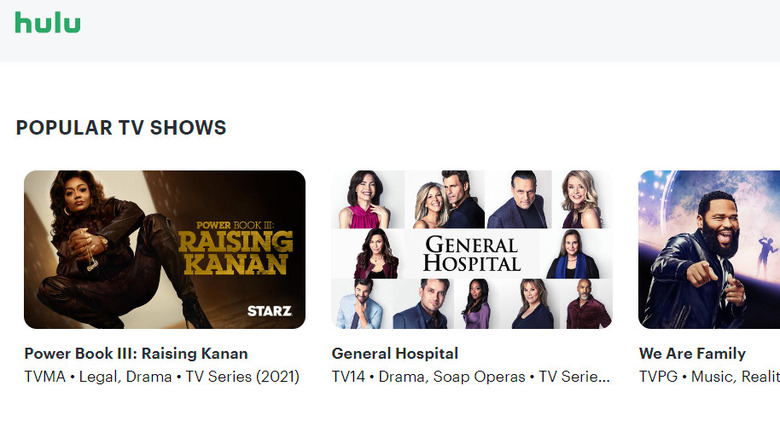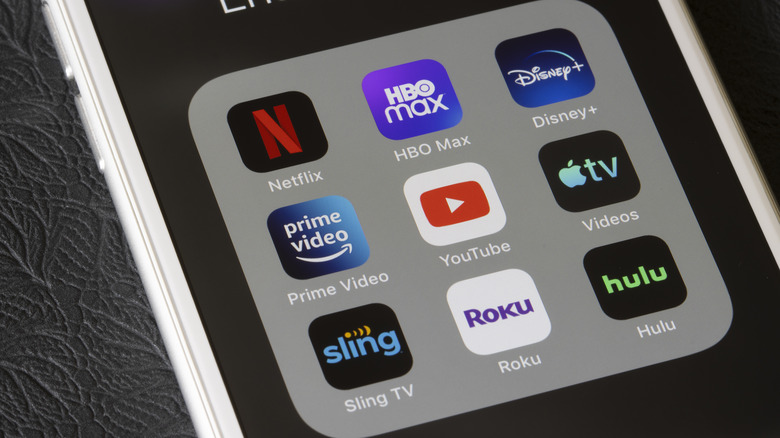Hulu's Password-Sharing Crackdown Explained: What Subscribers Need To Know
Streaming has changed not just the movie and TV industry, but also the kind of content audiences watch and even the way they watch them. But what was once a golden age has now come crashing down, as the nature of streaming circles back around to just being cable TV all over again. From constant price hikes to introducing ads — and now with streamers across the board shutting down password sharing — streaming is changing.
First, it was Netflix preventing its users from sharing the same account with people not living in the same household, then Disney+ announced it would do something similar. One of the latest streamers to join the club is Hulu, as it has initiated its own process of cracking down on password sharing. Users started getting emails from the streamer in early 2024 that warned them of a new user agreement — one that limits the sharing of accounts with people outside their household as of March 14, 2024. When enforcement of the policy will start is still a big question, though.
What Hulu's privacy policy says about password sharing
In the Hulu Subscriber Agreement, the company says regarding the topic of account sharing, "Unless otherwise permitted by your Service Tier, you may not share your subscription outside of your household. 'Household' means the collection of devices associated with your primary personal residence that are used by the individuals who reside therein." How does Hulu determine which devices you stream from are included under that designation, though? That part remains unclear unless you have a Hulu with Live TV plan.
In that case, you must set a residential network as your home location, which Hulu then uses to figure out "which streams are considered 'in-home' or 'out-of-home,' where relevant to the requirements of your subscription," according to the company's policy. You'll need to sign in to your Hulu account from that home network at least once every 30 days to keep everything operational. This requirement isn't in place for on-demand subscribers who don't have the Live TV add-on, however.
So, how does Hulu know whether you've shared your account with someone else or are simply streaming on your phone while connected to a different Wi-Fi network? The company doesn't go into details about that, but it likely boils down to whether your account is being accessed from a known mobile device versus being used via a smart TV app at a location other than the one you typically stream at. Hulu's updated subscriber agreement says, somewhat ominously, that it may occasionally analyze how your account is used and, if it decides you're breaking the account-sharing rule, suspend it.
It may be months before Hulu enforces its new policy
Though Disney also plans to prevent the password sharing of Disney+ accounts in 2024, it has not implemented any related changes and won't until at least the summer of 2024, according to the most recent Disney earnings call. This lends credence to speculation that while the new Hulu policy is now in place, the company likely won't actively enforce it until it has a solid framework in place to do so. That may include taking a page from Netflix's book by offering a way for mooching users to officially join an existing account by paying an extra fee.
When such provisions may be made available is unknown at the time of writing. It's possible that given Disney's full ownership of Hulu — and the two apps starting to merge – users can expect changes at Disney+ like the password-sharing crackdown to be mirrored at Hulu at around the same time. Still, if you are not keen on paying for an extra account, you probably don't need to act on it until you get a notification or email from Hulu, which is what Netflix did.
Where streamers like Netflix once seemingly took pride in password sharing, things have changed in recent months as the companies realized there is a ceiling to the number of subscribers they could reach. With no new markets to enter, the solution has been to split current subscribers into more subscribers. This is unlikely to stop, given how Netflix subscriptions have risen since they stopped password sharing.


